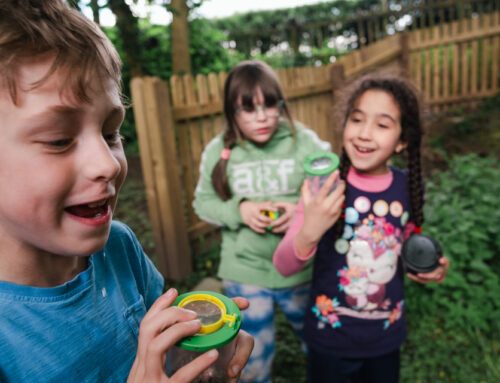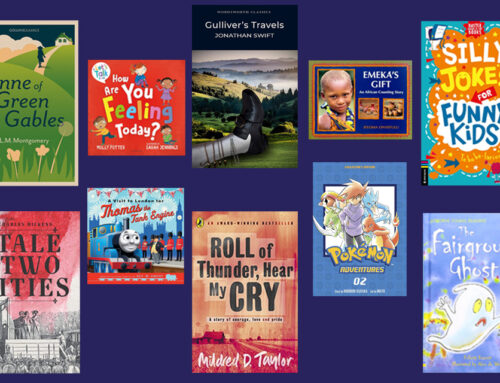“It is a truth universally acknowledged, that parents in possession of a high learning potential child, with a good deal of intensity and facing the post-Covid lockdown return to school, must be in want of a break.”
It is an anxiety-inducing time for most, but add in overexcitabilities and other characteristics common to children with high learning potential, and the high learning potential household may be pretty fraught in the lead up to their debutante season in the post-Covid school world.
Some children will have dipped their toes into the experience already, for others September will be their very first taste of it. Either way, the prospect of the new academic year, with all the Covid-related requirements, changes, and upheavals, may well be looming large in the minds of many children with high learning potential, and anxiety may well be high. How can parents support their child to get through this stressful time?
10 Ways to Support Your Anxious Child
- Understand
One of the first steps in helping your anxious child is to find out as much as possible about the characteristics common to children with high learning potential (see advice sheet PA102, Characteristics of Children with High Learning Potential), especially their intensities (see advice sheet PA 610, Hypersensitivity (Dabrowski’s Overexcitabilities)). It would be of inestimable support to gain as much of an understanding as possible about these characteristics and how they affect a child’s experience of the world, especially during this current global crisis.
Read up on the subject, familiarise yourself, and you will be able to provide the support and reassurance that a child needs to feel understood and supported all the way, even if anxiety cannot be solved with the flick of a magic wand. Sometimes, this is all the kick-start their confidence needs to take those first steps towards solving the problem.
It is also important to remember how much a child with high learning potential can be affected by their asynchronous development, whereby their cognitive development supersedes their emotional, social, and/or physical development (see advice sheet PA514 Asynchronous Development for more on this). Because of their asynchronous development, a child with high learning potential may well have a heightened awareness of current events but not the emotional skills to feel able to deal with it. This requires, first and foremost, understanding; know that this is a potential issue and keep an eye out for it.
When it comes to anxieties, therefore, especially in the context of the current crisis, look out for them, understand the possible causes, reassure, and remember that, however high their cognitive ability, they are still children in an unsettling situation. Never expect their emotional resilience in this lockdown to equal their intellectual understanding of it; they will be likely to need support to work through their worries.
- Acknowledge and Listen
As simple as it may sound, just listening to their concerns and making sure that they know that they are being heard is an important way to support a child with anxiety. If they feel that those around them are either uncomfortable about, or dismissive of, their worries, they may conclude that there is something shameful about their intense emotions, and that they must be hidden. This, of course, is not a healthy way forward for them.
- Remember the Situation
These are tough and unprecedented times, for all of us. Remember this and adjust expectations, including those of yourself, accordingly. As much as it is understandable to wish for a full solution and a return to whatever was normal before Covid-19, without that magic wand (or an inspired scientific discovery!), it is not necessarily the most practical of plans of action. Modelling an openness about the more difficult emotions that the current situation may be bringing, and just focusing on doing the small things that will help them to feel as okay as possible with what is, quite frankly, a rubbish situation, is not only enough, but actually of great help.
- Prioritise Relaxation, Wellbeing, and a Healthy Sleep Routine
Even when they are back at school, try to make time for some calming activities. Whether it is a relaxing evening walk; a bit of yoga, meditation, or guided relaxation; listening to relaxing music; or creating a calm corner in their bedroom dedicated to chilling out, make time for them to de-stress. Physical activity, too, can be a great outlet for all of that bottled up nervous energy. Whatever you choose, activities such as these can all help by shifting the focus away from their worries and boosting positivity.
Unfortunately, in the current situation, even we mere mortals are finding our sleep a little more disturbed, as our dreams give voice to our anxieties about the global situation. High learning potential children with anxiety may very well be finding sleep more difficult and dreams more disturbing at the moment, which won’t help their reserves of resilience for the next school day. Focusing heavily on relaxation in the evenings can help to offset some of the anxiety about what the night may bring and help towards a more restorative night’s sleep. For more help on sleep and children with high learning potential, have a look at our advice sheet, PA605, Sleep and High Learning Potential Children.
- Come Up with a “Top 10 Tried and Tested Comforts”
Help them to take control and feel the positivity that it can bring, by supporting them to come up with a countdown of their all-time favourite comforts. Perhaps their favourite film or book will be up there (both are great forms of escapism away from Covid-19, too…unless it’s Contagion, perhaps…), or even their favourite teddy or old toy. Other contenders might be their favourite comfort food, the place in the house or garden where they always feel calm and safe, or even an old blanket that they used to cuddle (or still do).
Whatever makes the list, the mere act of compilation will have shifted focus onto positives, and they will, at the end of it, have a list to refer to whenever they need a little emotional boost once they are home from school.
- Provide a Toolbox of Strategies to Help Them to Manage Their Emotions
As well as their top ten comforts, having a toolbox of weapons against those times when their anxieties feel overwhelming is also extremely helpful. A set of go-to strategies might incorporate the top ten comforts, but might also include mindfulness activity books such as Be Brave!; Hello Happy!; or No Worries!; writing down or drawing their worries (and then giving them to you, if they are comfortable in so doing); or having some breathing techniques to use when needed. Perhaps it could even be another top ten? Either way, having a known, specific set of weapons against anxiety or distress can help a child with high learning potential to feel a lot more in control of their emotions and provides the great boost of proving that there are things that they can do to help themselves. The confidence and sense of agency this can give can often mean that half the battle is already won.
You could also regard their trusty bookshelves as valuable tools for the toolbox, too. Their favourite books or audio books can justifiably be seen as positively therapeutic, as they can so wonderfully help to whisk their mind away from their anxious thoughts and redirect it to happier lands. Heading off to a quiet reading corner can be a simple but effective option open to them to help them manage their feelings.
For more ideas for the toolbox, see our advice sheet PA606 Worry and Anxiety in High Learning Potential Children.
- Advocate
School might be back and your role as teacher might be over for now, but take some of that home ed autonomy with you out of lockdown: if you have concerns, voice them; speak to school, let them know how your child is feeling. Not only can they then better help to support your child at school, armed with that all-important knowledge of what your child is finding most difficult, but it will be an important reassurance to you, as their parent, to know that school are aware of the issues your child is currently experiencing. Let school know what has worked at home in addressing their anxieties, as well as asking for their input when it comes to support, too.
- Take the Time to Notice the Small Things
An upside to the intensity of children with high learning potential is the tendency to find great joy in even the smallest of things. A beautiful sunset, the blossom on the trees, a caterpillar on a leaf; they can all elicit elation and, importantly, provide much-needed solace. Supporting them to really notice those small things will really help to boost your child’s wellbeing (and quite possibly your own!). If a slower pace can be achieved at regular intervals outside of school (admittedly a big “if”!), then taking the time to really notice the beauty that continues around us, coronavirus or not; to look at the clouds, to watch the birds, can really provide great emotional nourishment and, again, shift the focus away from the crisis and towards much happier thoughts.
- Exploit Their Imagination!
If your child is super-creative, encourage them to use that. The positivity of their creativity is by no means limited merely to situations when they need to manage their worries about school and the new normal. It is so much more than that. With their creativity often comes a wonderful sense of humour – use it to get you all through; there’s nothing more therapeutic than laughter. Let their imagination run wild, as long as the focus is positive; really encourage their magical thinking, it will go such a long way in helping them through.
They can go to different lands, visit imaginary friends, be any species they like and never limit themselves to the banalities (or stresses) of the here and now. They could create poetry, prose, plays; pen anything they like. Just because they are back at school doesn’t mean that they need to ignore these powerful outlets at home.
They can write, draw, daydream, whatever they want, and, yes, if they are feeling at all worried, they can create fantastical ripostes with their imagination where they are the superhero who saves the day, where everyone is safe and together again, where anything can happen; as long as it makes them feel better!
- Look After Yourself
It can be full-on, parenting a child with high learning potential at the best of times, with the intensity, the energy, the relentless questions, just the whole rollercoaster-ness of it all. It is even more full-on when they are experiencing particularly pronounced anxiety. Add a global pandemic and an upheaval of all their previous norms into the mix and the intensity can be interstellar. Whether it is finding your own calm corner where everyone else is strictly banned, making time for your own hobbies, or whatever else might help your own emotional wellbeing, remember that looking after yourself is important, too. If it feels difficult to get behind such a concept, then, remember that the better you feel, the better you can support your fabulous, yet exhausting, child with high learning potential!
Remember, too, that there is further help out there, if needed. If you remain concerned about your child’s mental wellbeing, then discuss with your GP, or visit Young Minds for further support and advice.
If you would like advice more specifically about the high learning potential aspect of your child’s issues, then contact our advice line, where you can book 30 minute telephone appointments (free to members, £36 to non-members) to discuss any issues concerning your child with high learning potential with someone who “gets” what it is like to parent high potential children.
About the author: Caroline Hooton-Picard is an adviser for Potential Plus UK. She has a background in mental health, having worked for Suffolk Mind and also in private practice, and has a first class degree in Philosophy from the University of Essex. She also has a High Learning Potential daughter who keeps her very much on her toes!






